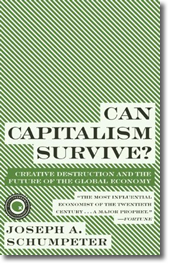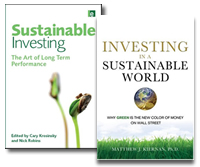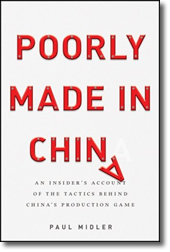Book Review: Can Capitalism Survive?
Monday, October 26th, 2009
Schumpeter, Joseph A. Can capitalism survive? : creative destruction and the future of the global economy. Harper Perennial, 2009.
A role of economists is to provide economic analysis of recessions such as the current one created by the financial crisis and provide strategies for restoring economic growth and prosperity.
Leading up to the current recession, The Federal Reserve lowered interest rates to make housing more affordable, and Fannie Mae and Freddie Mac developed a federal program enabling people to qualify for homes that ordinarily would not.
Subsequently, people purchased homes they could not afford and some lost their jobs due to the recession. Wall Street banks invested too heavily in risky loans rather than diversifying, accumulating toxic assets leading to tremendous losses.
Hayek goes as far to say that central banking destabilizes the economy. In the recent recession, government intervention led to inflation, over building, a housing bubble, and then economic indicators became unrealistic.
In addition to the destabilized housing market, the financial crisis had a ripple effect on travel, retail, the automobile and oil industries, and led to significant number of lost jobs.
Can Capitalism Survive? is excerpted from Joseph Schumpeter’s 1942 classic Capitalism, Socialism, and Democracy. This is where he proposed business cycles are caused by technological innovation, referred to as creative destruction. In Capitalist economies, markets eliminate obsolete technologies and utilize innovations to create new avenues for economic growth. (more…)


